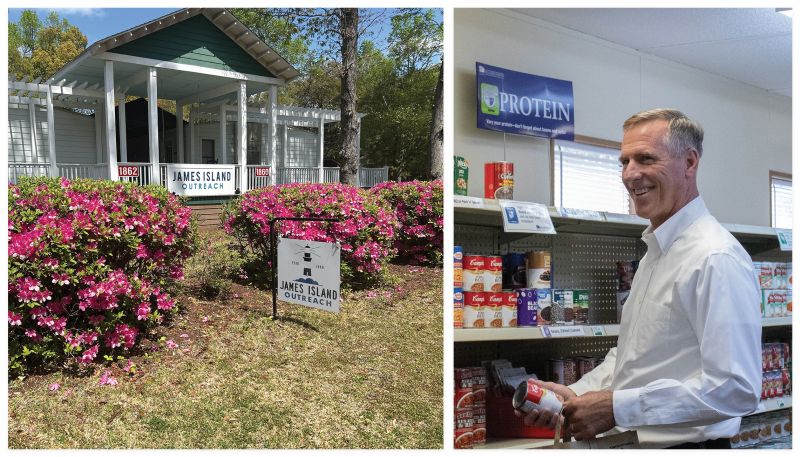Learn about the services the nonprofit provides and how to volunteer

Since its beginning in 1989, James Island Outreach, housed on Camp Road, has expanded from assisting residents in need with home repairs to providing a food pantry and financial assistance workshops; (right) executive director Jeff Gordon.
When Hurricane Hugo upended coastal Carolina in 1989, a dozen James Island churches came together to collaborate on a build-back mission, helping residents remove debris and repair their homes. More than three decades later, that group has evolved into James Island Outreach (JIO), a crisis center that provides an integral lifeline for those seeking nourishment and financial assistance.
In the years following Hugo, the focus of JIO has pivoted from home repairs to providing a variety of services for residents of James Island and Folly Beach. For executive director Jeff Gordon, who formerly worked as a construction superintendent for Charleston Habitat for Humanity, this means coordinating a task force of congregations, businesses, and individuals donating time, food, and funds.
“Coming out of COVID, James Island Outreach was facing a period of transition,” says Gordon, who was hired as executive director in 2023. “We had a paid, part-time staff for the first time; the client-choice pantry was in full operation again; and we were seeing the beginnings of what would be a dramatic increase in need for our assistance.”
Feeding neighbors in need requires a fleet of volunteers. “Food rescuers” secure packaged items that otherwise would go to waste from grocery chains such as Publix, Harris Teeter, and Aldi, while produce is either purchased from local farms or donated from other nonprofits such as Fields to Families on John’s Island. Two dozen churches donate specific items. “There’s a cereal church, a ramen church, a jelly church, a pasta church, and so on,” Gordon explains. “That way we can offer a wide variety of choices rather than have foods that are heavily concentrated in one section.”

(Left) James Island Outreach volunteers; (right) The food pantry is open to registered clients on Tuesday and Thursday mornings.
Volunteers then help distribute prepacked bags of food via drive-throughs at local churches on Saturdays, or assist in stocking the client-choice pantry, which includes dry and canned goods, produce, meat, and bread, at the nonprofit’s Camp Road home base on Tuesdays and Thursdays. Individuals without transportation can use a free taxi service to ensure their groceries get home safely. In 2024, the program distributed 313,000 pounds of food to community members.
While expanding its operation as a food bank, JIO also offers financial assistance workshops twice a month to educate clients on reducing expenses and essential tools for building a budget. The nonprofit also continues to provide critical home repair services through its Home Repairs and Accessibility Team, a program that has helped more than 40 clients with major house repairs, such as damaged roofs and flooring, as well as accessibility modifications.
Ester, a former client, used the food pantry during the pandemic and received assistance through the repair of her collapsed living room floor. Since then, Gordon says, her situation has improved, and she volunteers in the stockroom several days every week.
“The people of James Island continue to support James Island Outreach with donations, volunteers, and a genuine desire to help their neighbors,” he says. “We are very blessed to have such a wonderfully connected community.”
Due to the rising costs of living in Charleston, JIO has seen the number of clients nearly double over the past three years. “We have outgrown our space, so we are expanding by purchasing a third mobile building with funds granted from Charleston County and Bishop Gadsden,” Gordon says. “With this extension, we will be in an even better position to help folks.”
How to Help: To learn more about the services that James Island Outreach offers or how to volunteer, check out jioutreach.org or visit the office at 1860 Camp Road.